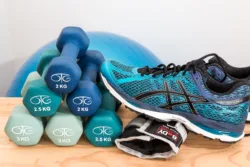
Have you ever completed a strenuous workout and, even though your body might be exhausted, you feel totally refreshed? Have you ever noticed that after a long day of sitting at a desk you find yourself wanting to go out for a walk?
Our body naturally desires that which is good for us, whether we notice it or not – including exercise. And while we all know that exercise is good for your physical health, it is just as important to realize the undeniable benefit exercise has on mental health as well.
The benefits of exercise for mental health
Over the years, exercise has seemingly been boxed into something you do to lose weight – but we often lose sight of how much more exercise does for our bodies and our mind! Not only does it keep our muscles strong and our stamina up, it also boosts our mental health in ways we might not even realize.
Improved quality of sleep
A poor sleep routine can significantly increase symptoms of depression and other mental health illnesses. But symptoms like insomnia, sleep apnea, trouble falling asleep and difficulty staying awake throughout the day have seen drastic improvements in individuals who hold themselves accountable to an exercise regimen.
Whether you choose to start your day with a session at the gym or brisk morning walk, complete your evening with a Spin or yoga class or simply stretch for ten minutes before going to bed, you will begin to notice an improvement in your sleep and your mental health overall.
Increase of natural chemicals in the brain
Exercising produces chemicals (like serotonin, endorphins and dopamine) in the brain, all of which play a significant role in improving your mental health and reducing the symptoms of a number of mental health disorders, including:
- ADHD – Dopamine and serotonin help increase memory, focus and motivation, all of which can suffer from untreated ADHD; exercise helps to reduce the symptoms of ADHD in ways similar to medications often prescribed to treat it
- Stress and anxiety – Endorphins help to ease tension and relax both the body and the mind; plus, if you’re doing exercises like yoga (which combine stretching with focused breathing), you’ll feel an increased sense of relief and peace overall
- Depression – Exercising helps get you moving and directs your mind to focus on other things, like how fast you’re running, how heavy the weights are or how controlled your breathing is. Even 15 minutes a day can help you move out of an internally focused state of mind and into a more peaceful state
Even a brief walk around the block can help you start feeling the positive effects of exercise on mental health.
Increased energy
While it might seem counterintuitive, exercise actually helps boost your energy overall. The connection between exercise and better sleep means more energy throughout the day, plus, if you start the day by moving your body, you’re less likely to feel sluggish and sleepy as the afternoon wears on. Thus, you’ll have more drive and energy to complete your checklist, leaving you feeling accomplished and motivated for tomorrow.
Exercises for your mental health
Exercise can be completely personalized to you and your needs. If you simply cannot fit a morning jog into your routine, but have time for a yoga class after work, sign up! If you dread the thought of a slow walk around the neighborhood but feel empowered after a session lifting weights, find a gym nearby. Whatever kind of exercise you feel most refreshed after, focus your energy on doing that.
Additionally, if you’re looking for something different to enhance your workout routine, consider any of the following exercises to boost your mental (and physical) health:
- Yoga
- Pilates
- Rock climbing (rock climbing gyms can be found in many cities around the country)
- Horseback riding
- Hiking or trail walking
- Jiu-jitsu
- Spin classes
- Dance lessons (local studios or ballet companies often have adult drop-in classes)
- Aerobic classes, like HIIT, Barre or Zumba
- Swimming
- Bicycling
Remember, this list is far from exhaustive. Find what makes you feel better physically and mentally and work it into your daily routine to help you overcome any mental health symptoms you might be experiencing.
Looking for additional mental health support?
Exercise is an excellent way to boost your mental health, but sometimes we need additional guidance and assistance through the challenges life throws our way. If you need to speak with someone about a mental health disorder, contact The Light Program. You can visit our website anytime or reach out by calling 610-644-6464 today.






